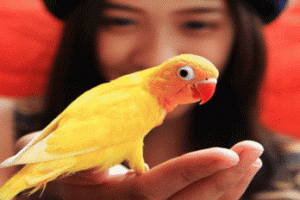
Unit 03
The Pet Economy
新知思想/趣味科普
New Knowledge/Fun Science
BRAIN STORM
Share your ideas with your teacher and try to make sentences.
Do you have a pet? How do you take care of your pet?
VOCABULARY
Repeat these sentences after your teacher.
1. ergonomically (n.) 符合人體工學地;工效學意義上
Check out this ergonomically designed massage chair.
看這把工學按摩椅。
2. splurged (n.) 揮霍,花很多錢
She splurged herself on a new dress.
她穿著一件新衣服揮霍自己。
3. bells and whistles (n.) 花里胡哨的東西
This darn car has so many bells and whistles that I can’t figure out how to open the gas tank!
這輛破爛的汽車有那麼多的花里胡哨的東西,以至於我不知道如何打開油箱!
4. raking it in (phr.) 賺大錢;輕易賺(很多錢)
We have the chance to really start raking it in if we can get our products into the Asian markets.
如果我們能夠將產品推向亞洲市場,我們就有機會真正開始涉足這一領域。
5. hand over fist (adv.) 迅速大量地(賺錢或賠錢)
He’s making money hand over fist.
他正在大量的賺錢。
6. urban alienation (phr.) 城市中人與人的疏離感
Urban alienation is common these days.
如今,城市疏遠現像很普遍。
7. mitigate (v.) 減輕,使緩和
He attempted to mitigate the offense.
他試圖減輕這種罪行。
Dialogue
Read the dialogue aloud with your teacher.

Hey, check out this ergonomically designed massage chair that I got for my cat, Feefee!
嘿,看這把工學按摩椅,這是給我的貓Feefee買的!

Talk about luxury! Looks like you splurged and got all the bells and whistles.
真奢侈!看樣子你花了不少錢啊,買了這些花里胡哨的東西。

I just couldn’t resist. I’m sure these pet companies are raking it in hand over fist.
好我就是忍不住要買。這些寵物公司絕對是日進斗金啊。

No doubt! The pet market has tripled in the last 5 years, with us millennials making up the largest cohort.
那還用說!寵物市場在過去五年裡就增長了兩倍,我們千禧一代的貢獻可是最大的。

Well, economically, we have the means, and with urban alienation being so pervasive these days, it’s no surprise that millennials are seeking comfort in pets.
從經濟上說,我們有這個財力,而且如今城市中人與人之間越來越疏遠,千禧一代在寵物的身上尋求安慰也就不足為奇了。

They do mitigate anxiety. But we also see pets as surrogate children, making us more willing to invest and indulge in their every need.
寵物確實能緩解我們的焦慮。但我們也會把它們看成是孩子的替代,這就讓我們更願意去花錢、去不停地滿足它們的所有需求。

Makes sense. A lot of us have a “spare no expense” attitude when it comes to pets, which has helped make the market resilient to recession.
有道理。我們中很多人對待寵物都抱著“不惜一切代價”的心態,這就讓寵物市場在經濟衰退的時候也能屹立不倒。

Yup, and companies know it. Premiumization has been a big thing, especially with food.
對,寵物公司很清楚這一點。所以高端化一直是個重點,尤其是寵物食品方面。

Oh, for sure! To make matters worse, I’m really susceptible to ads, so I buy lots of toys and clothes.
沒錯!更糟的是,我太容易被廣告吸引了,所以我買了好多的寵物玩具和衣服!

Yeah, you’ve definitely bought into the whole novelty trend, but hey, Feefee is one well-dressed cat!
是啊,對這些新奇潮流你肯定已經很買帳了,但你看,Feefee穿得多時髦呀!
Grammar
With + noun + verb-ing
The pattern “with + noun + verb-ing” is frequently used to express that something is the cause of a particular situation, and in that way is similar to “because.” For instance, in today’s lesson, the speaker said, “with urban alienation being so pervasive these days, it’s no surprise that the millennials are seeking comfort in pets.”
Here, we could also say “because/since urban alienation is so pervasive.“
Notice that this pattern is also frequently paired with “it’s no surprise” or “I’m surprised.” For instance, “With
cities being so crowded these days, it’s no surprise that the cost of housing has skyrocketed.” Or, “With everyone going home for the holidays, it’s no surprise that most of the train tickets have already sold out.”
1.With all the meetings happening this week, I doubt I’ll have much time to myself.
2.It’s no surprise that more millennials are getting pets, with pet policies in apartments becoming more lax.
3.With the schedule being as insane as it is, I’m surprised that more of us haven’t dropped the ball.
4._____________________________________________________________________.
DISCUSSION
Make a conversation with your teacher.
1.Would you rather buy animals in a pet shop or adapt stray animals in the streets? Why?


